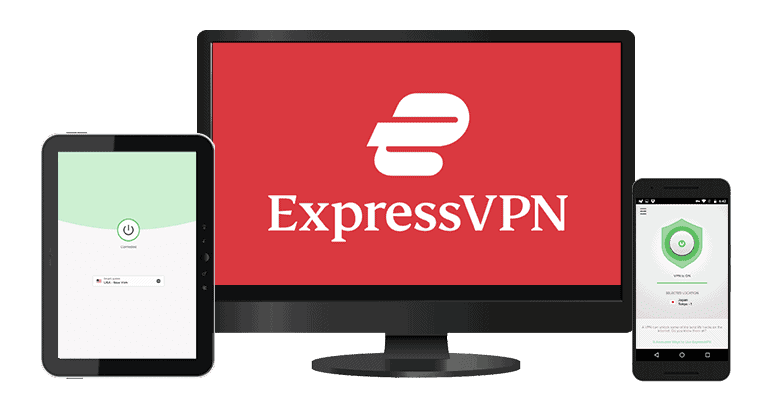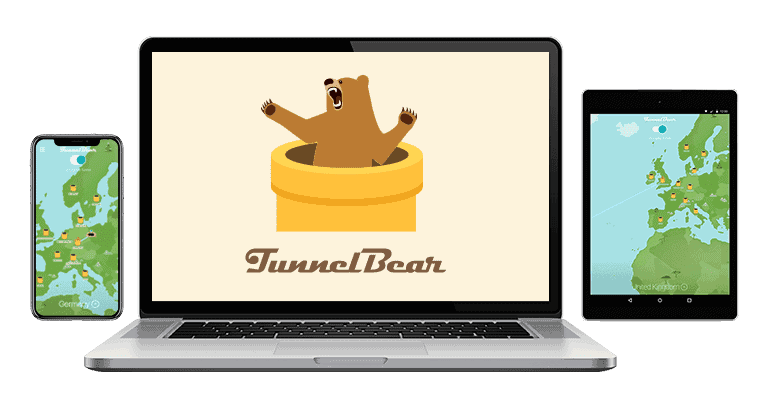
Updated on: October 7, 2024
Short on time? Here’s the best VPN for government bypassing:
- 🥇 ExpressVPN : Comes with obfuscated servers for bypassing government restrictions in countries like China, Iran, and Indonesia, and includes industry-leading security features. Maintains blazing-fast speeds across all servers, has a strict no-logs policy (independently audited and confirmed), allows up to 8 simultaneous connections, and covers each purchase with a 30-day guarantee.
Countries like China, Iran, and Indonesia set restrictions on what websites their citizens can view. While the best way to get around government firewalls is with a virtual private network (VPN), these restrictive countries also use sophisticated technology to detect and ban many VPNs.
That is why you need a VPN that has special features and protocols to evade these measures. Unfortunately, a lot of VPNs aren’t able to bypass government censorship — even some of the best ones out there — while a bunch of the VPNs are only able to access restricted content some of the time.
However, there are still some very good government bypassing VPNs available on the market. The ones I’ve chosen for this list are able to bypass most government restrictions with sophisticated obfuscation tools, have excellent speeds, provide high-end security features, and come with user-friendly apps for all of the major platforms. Editors' Note: ExpressVPN and this site are in the same ownership group.
Quick Summary of the Best VPNs for Government Bypassing
NOTE: Using a VPN to bypass government restrictions comes with some limitations. I want to make it clear that neither I nor SafetyDetectives.com support using VPNs in ways that break the law. It’s a good idea to get to know the local rules about VPNs to make sure you’re not accidentally breaking any regulations or laws.
Editors' Note: Intego, Private Internet Access, CyberGhost and ExpressVPN are owned by Kape Technologies, our parent company
🥇1. ExpressVPN — Best VPN for Government Bypassing
ExpressVPN is the top VPN for government bypassing in 2024. It provides obfuscated servers, which allow you to hide your VPN traffic and enable you to bypass geo-blocks without detection in countries that censor the internet. Obfuscation is automatically enabled when you use ExpressVPN’s Automatic protocol setting.
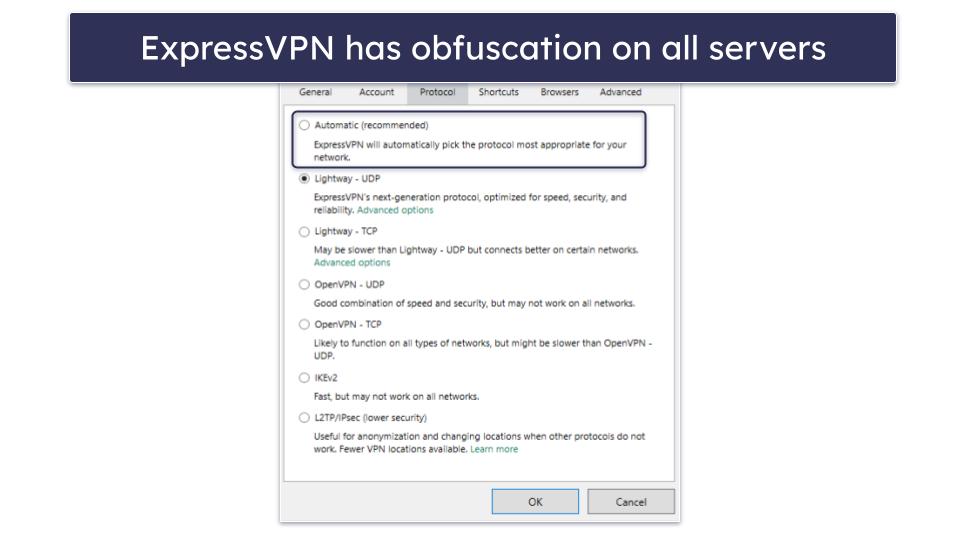
It has servers in 105 countries, allowing you to find a nearby server no matter where you live. For example, if you are in China, ExpressVPN has servers in Hong Kong and Japan, and if you’re in Iran, there are servers in Egypt and Iran.
When it comes to speeds, ExpressVPN is difficult to beat thanks to its proprietary Lightway protocol. In my tests on local servers, websites loaded right away and HD and 4K videos began immediately. On distant servers, there were only minor delays for all of my internet activities.
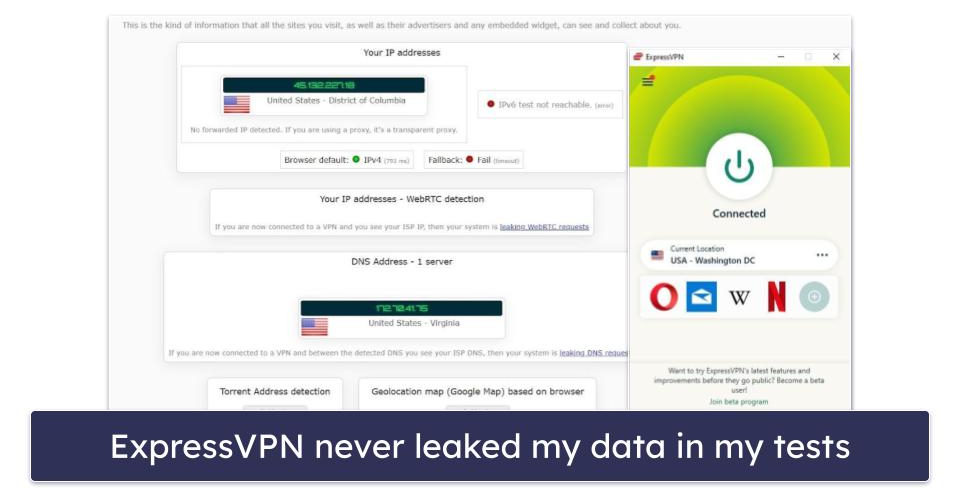
ExpressVPN also comes with top-notch security tools, such as:
- Perfect forward secrecy — This feature changes your encryption key every time you connect to a different server, so even if hackers somehow hacked your device or ExpressVPN’s servers, they wouldn’t be able to decipher any of your past or future transferred data.
- TrustedServer Technology — ExpressVPN stores your data on memory (RAM) instead of a hard drive, so all of your information is wiped each time the system is rebooted.
- Full leak protection — This feature ensures that your IP address and data never leak online. I tested servers in 10+ countries for leaks, and ExpressVPN returned a perfect score.
- No-logs policy — ExpressVPN’s no-logs policy has been independently audited and confirmed multiple times.
ExpressVPN offers monthly and yearly plans that start at $4.99 / month (and usually include additional months for free). It accepts Bitcoin (for more anonymous payments), and backs all plans with a 30-day money-back guarantee.
Bottom Line:
ExpressVPN is able to bypass government restrictions in all countries without detection. It’s the fastest VPN out there, and you also get high-end security features, including perfect forward secrecy and RAM-only servers. ExpressVPN offers a 30-day money-back guarantee on all of its plans.
Read the full ExpressVPN review
🥈2. Private Internet Access — Flexible Apps With Great Speeds
Private Internet Access (PIA) is secure, fast, and good at bypassing government restrictions in censor-heavy countries thanks to its Shadowsocks obfuscation protocol that disguises your VPN traffic as regular traffic — allowing you to get around government firewalls and mask your VPN connection from your ISP. Shadowsocks is a free and open-source encryption protocol project, widely used in China and other countries to bypass internet restrictions. This obfuscation tool can be enabled with just one click in PIA’s “Proxy Preferences” menu.
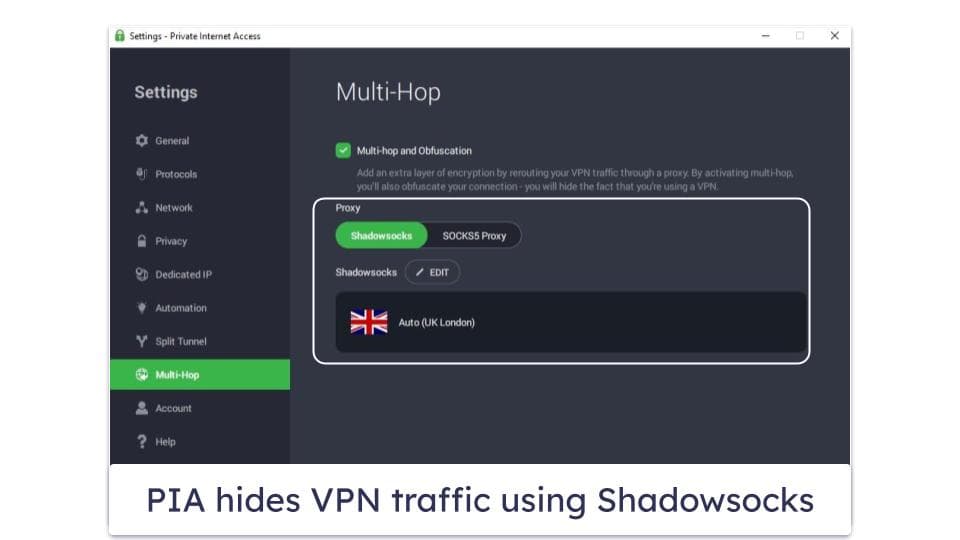
One of the drawbacks of Shadowsocks is that it slows down your speeds a little bit more than a regular server because of the extra layer of encryption (ExpressVPN’s obfuscated servers don’t affect your speeds at all). Even still, PIA maintained very fast internet speeds for all of my online activities. In my tests using Shadowsocks, websites took 1-3 seconds to load and HD and 4K videos only took a couple of seconds to begin (and played without any interruptions).
I really like how PIA’s no-logs policy has been independently audited and confirmed, as well as proven true in multiple court cases. Also, PIA releases semi-annual transparency reports that show how the VPN doesn’t share user data. In addition, PIA’s apps are fully open source, which means any user can dig through the code to see if there are any holes in security, and the VPN has RAM-only servers, perfect forward secrecy, and strong leak protection.
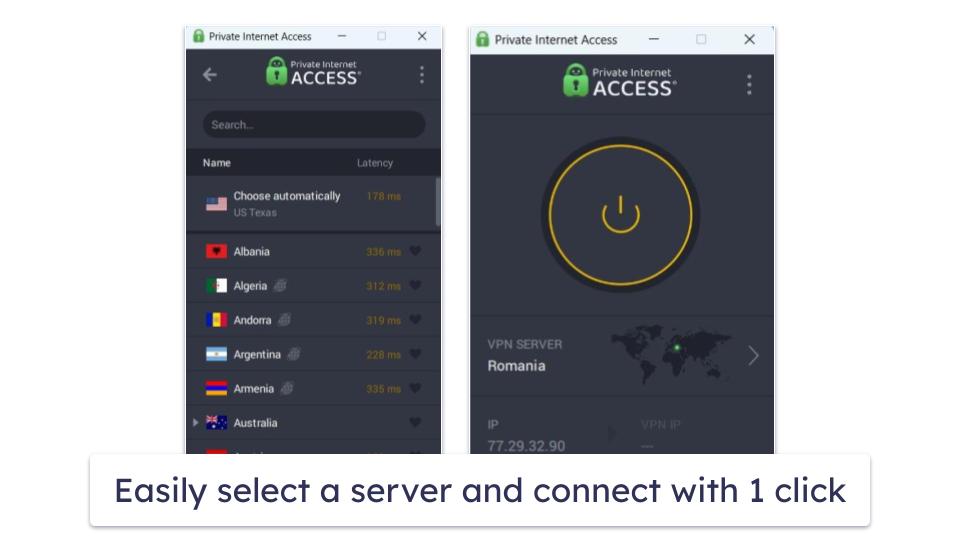
PIA comes with easy-to-install and intuitive apps for all of the most popular devices, and I like how all of the apps are very customizable (with 20+ options to change under its Settings menu, including encryption levels and enabling cool extra features like split-tunneling and an ad blocker).
Private Internet Access offers low-cost monthly and yearly plans that start at $2.03 / month. It accepts cryptocurrencies and even gift cards to help shield its customers’ identities and covers each plan with a 30-day money-back guarantee.
Bottom Line:
PIA’s Shadowsocks obfuscation protocol disguises your VPN traffic as regular traffic in order to bypass government restrictions and browse the web without detection. In testing, PIA was able to maintain pretty fast speeds, and it also includes excellent security features and user-friendly apps. PIA backs each purchase with a 30-day money-back guarantee.
Read the full Private Internet Access review
Editors' Note: Private Internet Access and this site are in the same ownership group.
🥉3. PrivateVPN — Simple VPN With Proprietary Protocol for Bypassing Censorship
PrivateVPN uses Stealth VPN, which disguises your online traffic and makes it seem as if you’re browsing without a VPN. This allows you to bypass VPN blocks and firewalls in countries that censor the web. PrivateVPN has servers in 63 countries around the world, which is less than ExpressVPN and Private Internet Access, but the servers are evenly dispersed in many different locations — and near restrictive countries like China, Venezuela, and Indonesia.
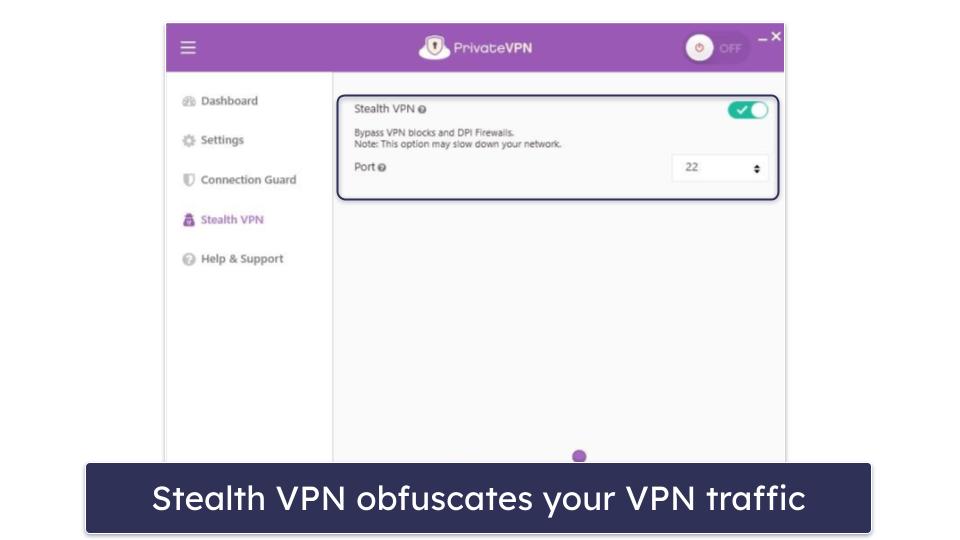
However, Stealth VPN will slow down your internet speeds since it adds an extra layer of encryption (like Private Internet Access’s Shadowsocks). When I connected to a nearby server with Stealth VPN, websites and videos took about 5 seconds to load (but there was no buffering once the videos actually started).
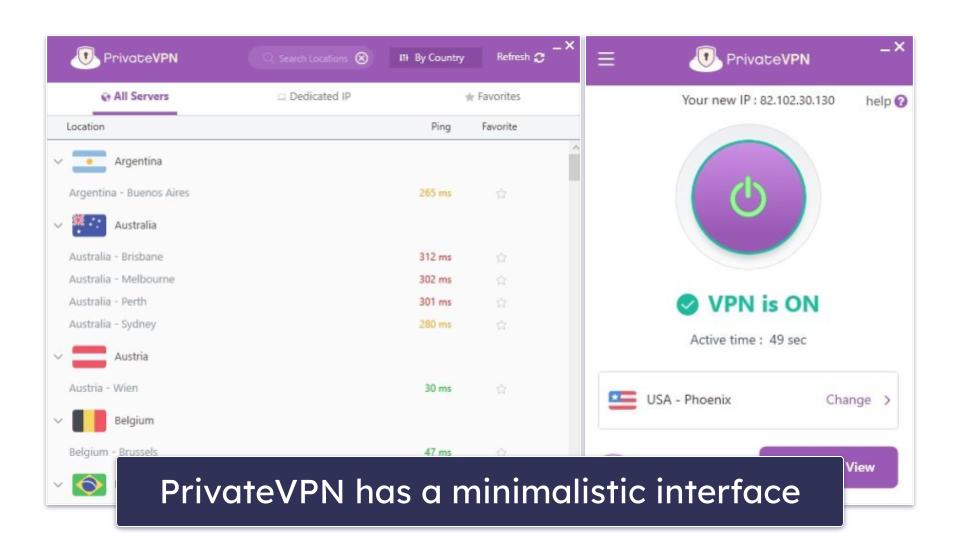
I’m a huge fan of PrivateVPN’s very minimalistic interface that makes it easy to navigate. I was able to find and connect to a server without any issues and found and enabled Stealth VPN with ease. That being said, PrivateVPN’s apps are pretty basic and don’t come with extra features like split-tunneling, an ad blocker, or a built-in speed test — and it’s missing RAM-only servers and perfect forward secrecy.
PrivateVPN has cheap plans that start at $2.00 / month, and it comes with a 30-day money-back guarantee.
Bottom Line:
PrivateVPN bypasses government restrictions undetected while using its proprietary Stealth VPN protocol. In my tests, PrivateVPN was still able to keep pretty fast speeds for uninterrupted browsing and streaming on all of its servers. It’s also very secure and easy to use. You can test PrivateVPN risk-free with a 30-day money-back guarantee.
Read the full PrivateVPN review
4. TunnelBear — Best VPN for New Users in Restrictive Countries
TunnelBear is one of the most beginner-friendly and fun VPNs on the market that comes with an obfuscation tool (GhostBear) that hides VPN traffic from restrictive governments — and you can turn it on with just 1 click.
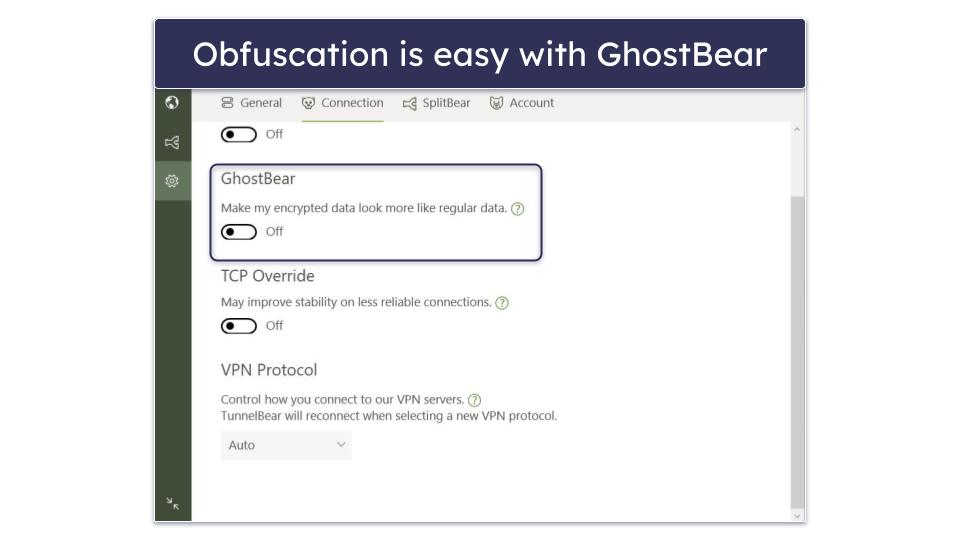
TunnelBear has the smallest server network on this list, but the servers are strategically located evenly throughout the globe in 47 countries. No matter what restrictive country you’re in, you’ll still be able to connect to a server in a nearby country to get fast speeds.
Speaking of speeds, I had good speeds using GhostBear, but TunnelBear is not as fast as ExpressVPN or Private Internet Access. In my tests on a local server, ad-heavy websites took up to 7 seconds to load, and content on Netflix Serbia took up to 10 seconds to start (and there was a little bit of lag).
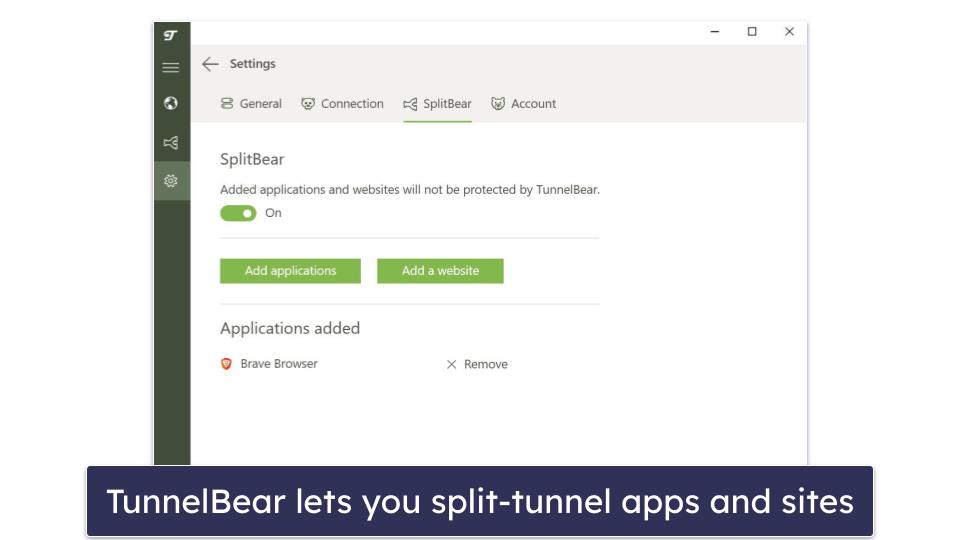
Unfortunately, TunnelBear is missing RAM-only servers and perfect forward secrecy, but I really like how the provider conducts an annual audit of its no-logs policy. Plus, you get split-tunneling and a free ad blocker for Chrome.
TunnelBear allows unlimited connections and has competitive pricing (plans start at $3.33 / month). There’s no money-back guarantee, but TunnelBear offers a free plan with 2 GB available per month.
Bottom Line:
TunnelBear’s stealth mode (known as GhostBear) works in restrictive countries with just 1 click, but it’s slower than the other top VPNs on this list. In our tests, TunnelBear was able to keep fairly fast speeds for browsing and streaming without much lag or buffering, but there are faster options out there. TunnelBear doesn’t offer a money-back guarantee, but it has a limited free plan.
Read the full TunnelBear review
5. VyprVPN — Good Obfuscation With Decent Speeds
VyprVPN bypasses government restrictions without detection. It uses its proprietary Chameleon protocol to hide your connection from your ISP or government entities. Since the Chameleon protocol disguises your internet traffic to make it look like you’re not using a VPN, countries can’t know that you’re using a VPN to bypass their firewalls.
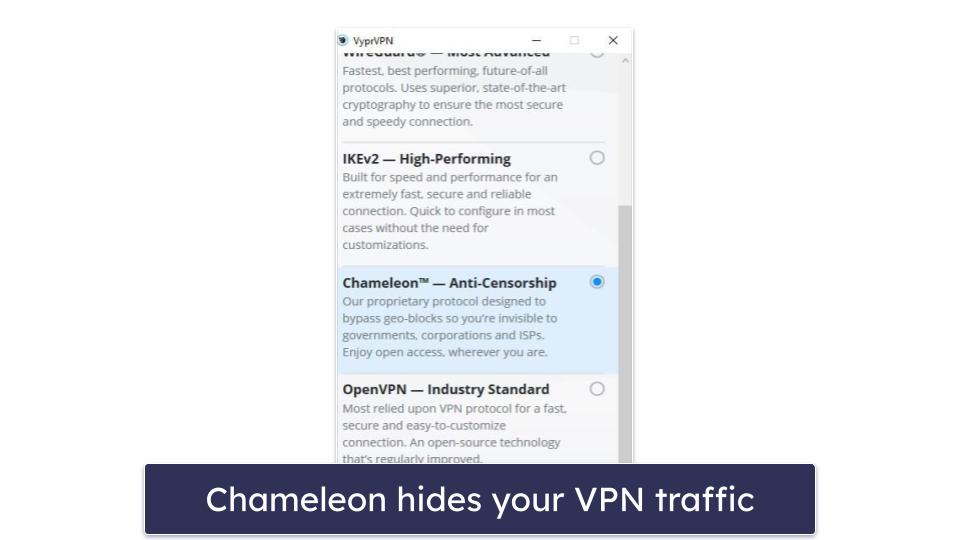
VyprVPN’s internet speeds aren’t as fast as ExpressVPN or Private Internet Access, but they’re still quite impressive. One of the really cool things about VyprVPN is its dynamic server switching tool, which can detect if a server is overcrowded and automatically switch you to a less crowded server. As for security, VyprVPN has perfect forward secrecy and a kill switch that allows you to set it up so you can’t access the internet without first connecting to the VPN.
With plans starting at $3.00 / month, VyprVPN is a budget-friendly option, and it backs each purchase with a 30-day money-back guarantee.
Bottom Line:
VyprVPN’s Chameleon protocol allows you to get around restrictions undetected. VyprVPN offers a risk-free money-back guarantee for 30 days with each purchase.
Quick Comparison Table
Editors' Note: Intego, Private Internet Access, CyberGhost and ExpressVPN are owned by Kape Technologies, our parent company
How to Choose the Best VPNs for Government Bypassing in 2024
- Opt for a VPN capable of circumventing censorship. The VPNs I suggest are equipped with obfuscation tools, enabling them to conceal your VPN traffic and navigate through government firewalls without being detected.
- Choose a VPN with strong security features. I only recommend VPNs that come with industry-standard VPN security features, including 256-bit AES encryption, a kill switch, a strict no-logs policy, and leak protection against DNS, webRTC, and IPv6 leaks.
- Pick a fast VPN. A VPN’s primary goal should be to secure your connection without significantly compromising speed. While all VPNs introduce some speed reduction due to encryption, the best ones minimize this effect. ExpressVPN, with its obfuscated servers, shines in this regard, consistently delivering top speeds.
- Choose a VPN that provides great value. I only recommend VPNs that have easy-to-use apps that support multiple platforms, allow at least 5 simultaneous connections, and offer competitive payment plans.
Why You Should Use a VPN in Restrictive Countries
A VPN offers essential protections in countries that heavily restrict internet access. Here are the main benefits of using a VPN in a restrictive country:
Protecting Your Privacy
Your personal data is at risk when browsing online, especially in restrictive countries where governments can actively monitor all internet activities. A VPN encrypts your internet connection, which scrambles it and makes it unreadable. This encryption makes it extremely difficult for unauthorized individuals, including government entities and hackers, to intercept and decipher the information. This also means that all of your sensitive work-related files, financial transactions, and any communications with your family are protected, too.
Circumventing Censorship
Governments in restrictive countries often block access to the open internet. For example, China bans Facebook, Instagram, Reddit, and YouTube. A VPN masks your IP address, making it appear as if you are accessing the internet from a different location, which allows you to access blocked websites, social media platforms, and news outlets freely.
Hide Your Real IP Address
No matter where you are, a VPN can mask your real IP address. This is great for privacy as it will hide your physical location and make it difficult for any snoopers to generate a profile of you. What’s more, certain streaming services impose geographical restrictions and only show content to people in certain areas. Many top VPNs can access popular streaming services from restrictive countries by hiding your IP address. They also encrypt your traffic so all of your streaming activities are hidden from your ISP and the government.
Ensuring Freedom of Speech
Expressing your opinions freely can be risky in restrictive countries. A VPN encrypts all of your traffic and protects your communications from potential eavesdroppers and hackers, providing a safe channel for you to speak your mind without the fear of being tracked.
Protect Your Data on Public Wi-Fi
Public Wi-Fi networks come with several security and privacy vulnerabilities, such as hacking and government surveillance. A VPN creates a secure and encrypted tunnel for your data, effectively shielding you from these dangers and ensuring your online activities remain confidential and safe.
Anonymous Torrenting
In many restrictive countries, governments limit torrenting and restrict access to services like Tor, which are often used to maintain anonymity online. So if you want to torrent in a restrictive country, chances are, you’ll need a VPN to hide your IP address. This way, it’ll be very difficult for authorities and other entities to trace your online actions back to you.
Please note: Neither I nor anyone on the SafetyDetectives team encourage streaming or torrenting of copyrighted or otherwise illegal materials. You should also check local laws and regulations to ensure that your activities are not illegal in your country.
Top Brands That Didn’t Make the Cut:
- Proton VPN. Proton VPN provides obfuscation and Alternative Routing, which should help you get around government firewalls. Despite that, the provider doesn’t work in China, and it only maybe works in other restrictive countries.
- Mullvad VPN. Mullvad VPN is fast, secure, and has obfuscation to hide your VPN from restrictive governments. However, Mullvad VPN’s obfuscation tool is very difficult to set up and use.
- Hotspot Shield. Hotspot Shield is a very fast and secure VPN, but it isn’t always reliable for bypassing firewalls in restricted countries.
Frequently Asked Questions
What’s the best VPN for bypassing government restrictions?
ExpressVPN is my top pick for bypassing government restrictions in 2024. ExpressVPN uses obfuscation with its Automatic protocol setting to access all geo-blocked web content by restricted countries. It’s also fast, comes with excellent security features, and offers easy-to-use apps for all devices.
Is it legal to bypass government restrictions with a VPN?
Some countries that restrict access to a free and open internet have banned the use of VPNs. If you’re using a VPN in a country that doesn’t allow VPNs, you may be breaking the law. It’s best to check your country’s local laws before using a VPN.
If usage of a VPN is allowed, you should buy a VPN before you arrive because you may be unable to access the VPN’s website from inside that country. ExpressVPN confirmed it works in restrictive countries and provides APK downloads in case you can’t get onto the website.
How do I bypass government restrictions with a VPN?
Bypassing government restrictions with a VPN requires only 4 steps:
- Get a VPN that can bypass government firewalls before traveling to a restricted country. I recommend ExpressVPN because it works 100% of the time in restrictive countries, has top-notch security features, and maintains the fastest speeds in the industry.
- Download and install the VPN. Just follow the installation wizard’s instructions. The whole process should take just a couple of minutes.
- Enable obfuscation. Follow the instructions for how to turn on the VPN’s obfuscation tool. For example, ExpressVPN requires you to set your protocol to “Automatic”, while Private Internet Access requires that you enable the Shadowsocks proxy.
- Connect to a server. Open the app, scroll down the list of servers, and choose a server in a country that is closest to you that doesn’t restrict the internet. Now, you’re able to browse a free and open internet.
Can I use a free VPN to bypass government restrictions?
Maybe, but I don’t recommend that you use one. Most free VPNs don’t consistently work in restrictive countries, and they also lack essential security features, are slow, limit how much data you can use, and have glitchy apps.
It’s best to use a premium VPN like ExpressVPN for bypassing government firewalls — it’s very secure, maintains very fast speeds, has a strict no-logs policy, and comes with a 30-day money-back guarantee.
